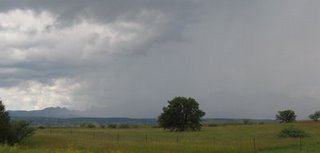- First, do you believe that miracles can happen?
- If yes, then do you believe that they do?
* * *
What I find interesting is there are people who profess to believe in God, but in the same breath state quite firmly that miracles are impossible. The only way I can square that peg is to imagine they think God simply is the natural, and not beyond it. Or they have a limited view of God -- he being all bound up and impotent in some lofty cloud somewhere.
Or they haven't really given much thought to what they're saying.
* * *
The "Separation of Church and State" thing is what is supposed to keep churches from campaigning actively. There are all sorts of ways around it, most commonly by not naming a candidate by name. Of course, when the candidate himself is in the pulpit it strikes me as obviously campaigning, but I guess again it comes down to what they're saying. And they're all crafty devils, so I'm sure they skirt up to the line and are careful not to cross it.
Did you know that the phrase "Separation of Church and State" does not appear anywhere in the U.S. Constitution? It's true. It's a contrived constitutional principle, now deeply entrenched in our case law. It's based on the first amendment, which reads:
Congress shall make no law respecting an establishment of religion, or prohibiting the free exercise thereof; or abridging the freedom of speech, or of the press; or the right of the people peaceably to assemble, and to petition the Government for a redress of grievances.That first part is known as "The Establishment Clause." All the stuff about courthouses not being able to have references to the Ten Commandments and schools not being allowed to have Christmas pageants was all built on those 16 words.
Wikipedia has an interesting write-up on the whole thing, as usual:
* * *
I went for a long motorcycle ride today with my new floorboards (they replaced the pegs). It has made a world of difference in terms of the comfort of the bike. The stock pegs were quite a ways out front, which meant my body orientation was all askew. I much prefer to have my feet and legs under me, rather than out front of me. Some people love that stretched out position, but I don't.
Here's a picture I took today:

Click here for a bigger version of it.
I rather like that picture ... it evokes a sense of foreboding and loneliness. Not that I like feeling lonely and foreboded, but any picture that stirs the emotions is a good picture.
I cropped that picture so the aspect ratio was flow and wide ... I love that effect. I can see why film makers prefer a wide aspect to a TV-aspect.
Here another one. And yet another.
Oh heck ... one more.
No comments:
Post a Comment